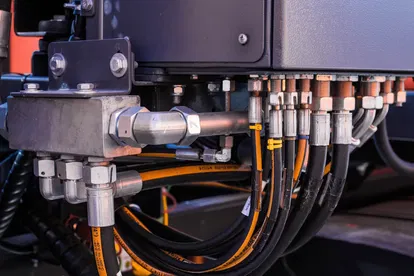Category:
What Is Hydraulic Fluid? How To Choose the Right One

Hydraulic fluid provides lubrication and is used in machinery and other systems to transmit power. Hydraulic fluids also perform other duties, including, sealing, helping with contamination, and aiding in cooling systems. Choosing the right type of hydraulic fluid is critical and some fluid types are suited better for specific types of environments. Hydraulic fluid is sometimes referred to as hydraulic oil.
When it comes to hydraulic fluid, one size does not fit all. Let’s talk about the different types of hydraulic fluid.
What Are the Different Types of Hydraulic Fluid?
There are various types of hydraulic fluids and it’s important to understand the purpose of each different type of fluid to meet your specific needs. Most hydraulic fluids fall into one of four categories.
Synthetic Hydraulic Fluids
Synthetic hydraulic fluids can come with a higher price tag, but their intended purpose is for the industrial and aerospace industries. These fluids are made using carefully selected chemically engineered compounds.
If your vehicle requires strong performance under extreme temperatures or high-pressure conditions, you may need a synthetic type of hydraulic fluid.
Petroleum-Based Hydraulic Fluids
The most popular and widely used type of hydraulic fluid is petroleum-based. This is due to its excellent lubrication abilities, creating thermal stability.
Petroleum-based hydraulic fluids have properties that resist oxidation and wear and tear. Industries that rely on petroleum-based hydraulic fluids include construction, automotive, and agriculture industries, to name a few.
Water-Based Hydraulic Fluids
If you require a hydraulic fluid that is fire-resistant, you’ll want a water-based hydraulic fluid. These types of fluids are made from water-glycol and water-in-oil emulsions. Compared to petroleum-based fluids, water-based hydraulic fluids have less lubrication. Many use cases exist for these important fluids, including marine and offshore equipment foundries and mining operations.
Even environments with power generation require this type of hydraulic fluid, where a fire-resistant substance is critical.
Biodegradable Hydraulic Fluids
Biodegradable hydraulic fluids, which are environmentally friendly and can be used in some instances, are typically derived from vegetable oils or sometimes made from synthetic esters.
Biodegradable hydraulic fluids can break down naturally over time, which is beneficial when operations are in areas adjacent to waterways or even agricultural environments.
How To Choose Hydraulic Fluid for Your Vehicle
Choosing the right hydraulic fluid for your vehicle is crucial for maintaining optimal performance and longevity — and there are a few factors you should consider to ensure compatibility and efficiency.
Manufacturer Recommendations
It's important to check your vehicle's manual or manufacturer recommendations to identify the specific type of hydraulic fluid required. Different vehicles and hydraulic systems have varying requirements based on factors like temperature range, viscosity, and additives.
Operating Conditions
Understanding the operating conditions is vital when selecting hydraulic fluid. Consider the temperature range in which your vehicle operates, as this affects the fluid's viscosity and performance.
For extreme temperatures, you may need fluids with enhanced thermal stability and anti-wear properties to prevent system damage.
Hydraulic System Specifics
Additionally, assess the load-bearing capacity and pressure requirements of your hydraulic system. Choose a fluid with the appropriate viscosity grade and anti-foaming properties to ensure smooth operation and protect against wear and corrosion.
Regular maintenance and monitoring of fluid condition are also essential. Check for signs of contamination, degradation, or leaks, and replace the fluid as needed to maintain system efficiency.
What To Avoid With Hydraulic Fluids
Some common mistakes when using hydraulic fluids are not checking with the manufacturer specifications on the label. Always check the label before working with hydraulic fluids, or consult a professional. A common mistake is assuming all things are created equal when it comes to hydraulic fluid and treating them all in the same way. This can be easily avoided by reading the label.
You’ll want to be sure to dispose of all types of hydraulic fluids in the right way to protect the environment and to keep in mind the guidance and regulatory requirements of the EPA (Environmental Protection Agency).
What Maintenance Is Needed for Hydraulic Fluids?
Selecting and using hydraulic fluids is only part of the work needed for efficiency and longevity with vehicles and equipment. The next steps involve maintaining your hydraulic fluids over time.
Testing hydraulic fluids is key to stay on top of contamination, and see if any additives are necessary. The basics of maintaining hydraulic fluids also include keeping fluids clean by replacing filters on a regular schedule, and storing fluids properly to ensure quality. It’s also critical to ensure the temperature is controlled, and part of this is making sure that the cooling systems are in good working order.
Lastly, replacing fluids when necessary is part of a maintenance plan for hydraulic fluids. When you do this, it’s imperative to flush the system each time. This will reduce the amount of contaminants and ensure the best possible outcome when using hydraulic fluids.
When using hydraulic fluids, you should always watch for any signs of degradation of the fluid as a red flag for additional discovery.
The Bottom Line
Hydraulic fluid is essential for machinery and systems, providing lubrication, power transmission, sealing, contamination control, and cooling. There are four main types of hydraulic fluids: synthetic, petroleum-based, water-based, and biodegradable, each suited for different environments and applications.
Key properties to consider when selecting a hydraulic fluid include additives, viscosity, operating temperature thresholds, compatibility, and environmental impact. Proper selection and maintenance are crucial, as using the wrong type or neglecting manufacturer guidelines can lead to system damage.
Sources:
Hydraulic Fluids | Engineering Library
Managing Used Oil: Answers to Frequent Questions for Businesses | EPA